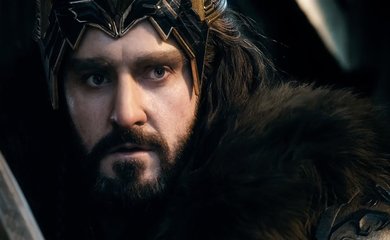Thorin Oakenshield stalks the great halls of Erebor like a Shakespearian king, tragedy draped around his shoulders. This doom-laden cloak threatens to drag the King Under The Mountain into a quagmire of greed and brutality, of dangerous isolationism while the greater world burns and passes him by. This “dragon sickness” sucks at his soul warping his perception of kinship. He suspects everyone of conspiring against him by stealing his birth rite, The Arkenstone, even his closest companions. “One of them is false,” he hisses at Bilbo pointing at the Dwarves with murder and the shadow of dragons in his eyes.
Once again corruption is firmly at the heart in the final chapter of Peter Jackson’s epic campaign of conquest into Tolkien’s Middle Earth. Lord Acton’s words are well known, “power tends to corrupt, and absolute power corrupts absolutely. Great men are almost always bad men.” Forget Saruman and the others, is “The Hobbit: The Battle of the Five Armies” autobiographical? Is Jackson like Oakenshield battling for his very being? Have 13 years of bondage with Sauron and the black hordes of Mordor taken their toll on the director who traded the DIY spontaneity of “Bad Taste” and “Meet The Feebles” for the Hollywood machine finally cursing him as the tenth Ring Wraith?
It’s an intriguing proposition and a fascinating allegorical tale of heroism and foolhardy hubris against impossible odds. Richard Armitage’s Thorin is a Hollywood version of Jackson, thinner, fitter and with a better-looking beard. Thorin’s greed unleashes Smaug’s pyrotechnical wrath upon the people of Lake-town in unflinching scenes of destruction. As the buildings burn into ash like Dresden or Tokyo we wonder if Smaug is the power of the Marvel über-franchise given form, a destructive entity unwittingly conjured by Jackson himself when he bravely undertook making the “Lord of the Rings” trilogy back to back in the late 90s so all three films would all be seen by cinema audiences and not just the first installment.
Bard, the solitary human warrior with the brains and brawn to take on the dragon, repels Smaug’s apocalyptic attack. It’s a thrilling prologue to the main movie but feels rushed and disjointed by the yearlong gap that separated “The Desolation of Smaug” from “The Battle oh the Five Armies.” As Bard joins combat from atop a burning spire we can see the spirit of Jackson guiding the black arrow to the serpent’s heart, the defiant last stand of the independent filmmaker reclaiming his soul from the moneymen. We can’t blame him for the spectre of Disney looming unchallenged over the childhood of millions, possessing Marvel, Star Wars and even The Muppets, reanimating the corpses of old stories for an audience held in bondage before their corporate masters.
Let’s not forget that Jackson pushed the envelope of technology and epic storytelling, rewriting the modern myth of Middle-Earth just as if they were Greek tales of old. “The Battle of the Five Armies” is fast paced, action-packed and recklessly uneven in places-just like a real battle. Bilbo and other characters come and go, lost in the fog of war amongst the press of thousands of digital extras. Mobile Troll artillery is expertly deployed, Legolas joins the fray and a slippery duel to the death between Thorin and the Orc chieftain on an icy peak is suitably spectacular. And what about that explosive superhero team up between Saruman, Elrond and Galadriel? Surely that’s one standalone movie that won’t happen.
But at the centre of the melee between Orcs, Elves, Dwarves, Eagles and Men are the emotionally charged final scenes between Bilbo and Thorin. Cradled in Bilbo’s arms the dying Dwarf King utters his last words–“Go back to your armchair, Master Baggins. And your books. Plant your tree. If everybody valued home like you did, the world would be a merry place.” We know we’ve probably left Middle-Earth for at least a generation and perhaps that’s why these scenes are loaded with pathos as those great players exit the realm for the last time. Yes you are allowed to shed a tear and clear that lump in your throat because who would have thought that such a feat of arms as filming the pomp and grandeur of Middle-Earth possible little more than a decade ago? Peter Jackson has earned his rest under the mountain.

